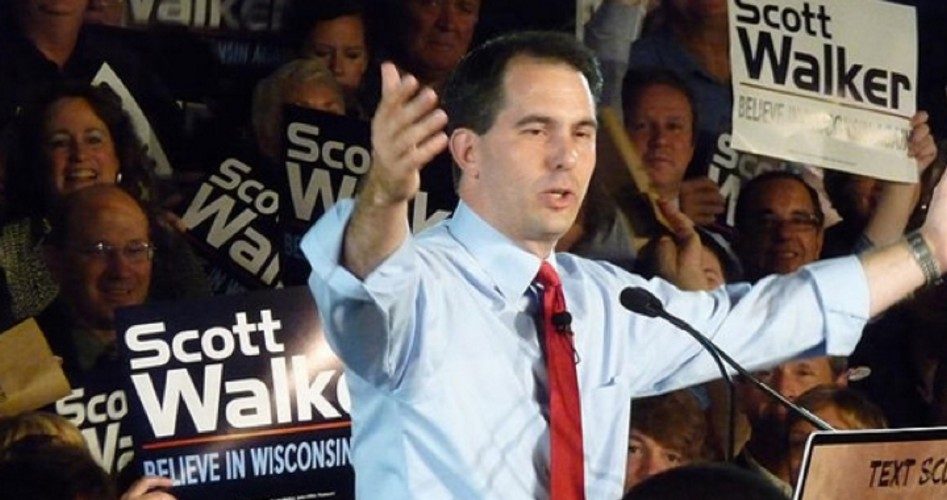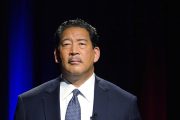
During an April 20 interview with conservative talk-show host Glenn Beck, Wisconsin Governor Scott Walker (shown) suggested that he supports limiting legal immigration, if necessary, to protect jobs for American workers.
Walker told Beck:
In terms of legal immigration, how we need to approach that going forward is saying we will make adjustments. The next president and the next Congress need to make decisions about a legal immigration system that’s based on, first and foremost, on protecting American workers and American wages.
Because the more I’ve talked to folks — I’ve talked to Senator Sessions and others out there, but it is a fundamentally lost issue by many in elected positions today — is what is this doing for American workers looking for jobs, what is this doing to wages, and we need to have that be at the forefront of our discussion going forward.
Senator Jeff Sessions (R-Ala.), who is the chairman of the Senate Subcommittee on Immigration and the National Interest, has been outspoken about the ill effects of immigration, especially President Obama’s immigration executive order, which would provide amnesty from deportation for some five million illegal aliens. The Alabama senator has also criticized what he regards as overly generous concessions to legal immigrants at the expense of U.S. workers. On February 24, for example, he criticized the government’s extension of eligibility for employment authorization to dependent spouses of H-1B workers, saying:
Only days ago, a major utility company laid off hundreds of workers and forced them to train the H-1B guest workers hired to replace them. Tech companies have been laying off workers by the tens of thousands. How does the Obama Administration respond? By bowing to special interest demands and expanding foreign worker programs by another 180,000. The Administration says this is to reduce the “personal stresses” on guest workers. What about the stresses on American workers, and their families and spouses, and their children?
In another interview on April 20 with Megyn Kelly on the Fox News Channel’s Kelly File, Walker addressed both legal and illegal immigration and their impact on American workers. He talked of traveling to the border with Texas Governor Greg Abbott, personally viewing the problems there, and concluding, “We need to secure the border, we need to enforce the laws that we currently have with an e-verify system.”
Walker also said that the problem along our borders is “far bigger than immigration.” He noted that also crossing our border are “potentially ISIS-related elements,” and “there’s safety issues from the drugs and drug trafficking and gun trafficking” along our largely unsecured borders.
After Kelly told him that he was “pretty much in line with the other Republican candidates” on those positions, Walker went on to talk about the impact that even legal immigration can have on jobs:
Well the one thing [the other candidates are] not saying is we need to make sure as part of that any future legal immigration system that goes forward has to account for American citizens and the workers of this country and their wages to make sure that even with legal immigration in this country we respond to it in a way that doesn’t take jobs away from hardworking Americans.
Walker’s comment naturally drew negative feedback from those whose support of “immigration reform” goes beyond legal immigration, but also extends to granting amnesty to illegal aliens. Among these was Senator John McCain (R-Ariz.), the Republican Party’s 2008 presidential nominee and a member of the “Gang of Eight” that drafted such a plan that passed the Senate in 2013 but was never taken up by the House. “I think most statistics show that [immigrants] fill part of the workforce that are much needed. We have, and I’m a living example of, the aging population. We need these people in the workforce legally,” McCain told reporters.
When reporters asked McCain if he worries that Walker’s position makes the Republican Party look “anti-immigrant,” McCain replied: “I do.”
However, Walker and Sessions have never advocated ending legal immigration, merely taking the U.S. job market and the unemployment rate into consideration when deciding what the current immigration quota should be.
AshLee Strong, a spokeswoman for Walker’s political organization, sent an e-mail to Talking Points Memo (TPM) explaining the governor’s immigration position: “Governor Walker supports American workers’ wages and the U.S. economy and thinks both should be considered when crafting a policy for legal immigration,” Strong told TPM. “He strongly supports legal immigration, and like many Americans, believes that our economic situation should be considered instead of arbitrary caps on the amount of immigrants that can enter.”
When asked by reporters to comment on Walker’s statement, Sessions said:
I thought it was a good statement that he made, which is saying, “I’m gonna ask the question, what is it going to do for wages and job prospects for my constituents and the American people as I analyze how to create a proper immigration flow into America. We’re not going to end it; we’re going to maintain immigration.”
Immigration is an emotional issue for many people, and a political candidate’s words are bound to be taken out of context and used against him. Therefore, it is important to weigh a candidate’s position not only on illegal vs. legal immigration, but also whether the candidate favors practically unrestricted legal immigration or sensible quotas on such immigration. Among the problems to be evaluated are the impact of large-scale immigration on jobs, the cost of education and social services, and its effects on our nation’s political and cultural heritage.
Photo of Scott Walker: WisPolitics.com
Related articles:
Report: Scott Walker Supported Amnesty Just Two Weeks Ago
Scott Walker Clarifies Position Against Amnesty for Illegals



